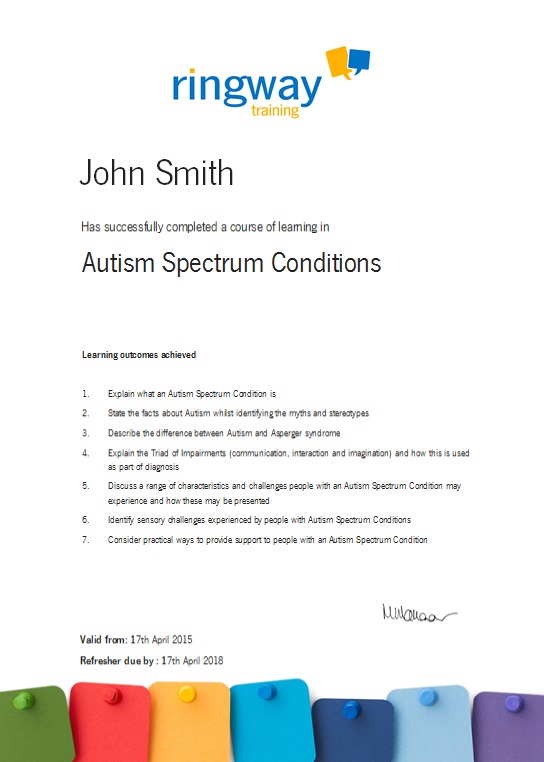Course Summary
Attention Deficit Hyperactivity Disorder (ADHD) is a diverse neurodivergent condition which affects each person with a diagnosis in a different way and the charity ADHD UK states that an estimated 2.96 million people in the UK have ADHD.
This training course describes the meaning of neurodivergence and neuroplasticity and how these relate to ADHD as a diverse and spectrum condition which required individual support and strategies.
This training course will describe the three different types of ADHD, consider potential societal misperceptions associated with ADHD and explain characteristics which are often associated with ADHD.
This training course will evaluate theories connected to ADHD including genetic, dopamine release, self-regulation, developmental delay and adverse early life experiences (trauma) and considers how some teenagers and adults may experience ‘latent vulnerability’ because of early life experiences and how this could be presented through reactions and behaviours which can be challenging.
This training course confirms the meaning of executive function (also known as dysfunction), how this is a combination of factors including self-organisation, self-regulation and self-evaluation and describes the meaning of sensory regulation and how overstimulation can impact a person with an ADHD diagnosis.
This training course will discuss the importance of challenging associated stigma when working in a support profession, explain ways of providing support to a person with a diagnosis of ADHD and consider environmental adaptations which could be made to reduce overstimulation. This is an accredited training course.
Course Learning Outcomes
Review the learning objectives below. Expand each aim to view the detailed criteria this course covers.
- 1.1Describe what ADHD is
- 1.2Describe the meaning of neurodivergence and neuroplasticity and how these relate to ADHD
- 1.3Clarify ADHD as a diverse and spectrum condition which required individual support and strategies
- 1.4Describe the three different types of ADHD
- 1.5Identify with key medication often prescribed to people with an ADHD diagnosis
- 1.6Evaluate potential societal misperceptions associated with ADHD
- 2.1Explain characteristics which are often associated with ADHD
- 2.2Evaluate theories of ADHD and genetics
- 2.3Explain links connecting ADHD to dopamine release and how this leads to reactions
- 2.4Consider theories relating to ADHD and developmental delay
- 2.5Analyse theories relating to ADHD and the impact of adverse early life experiences/trauma
- 2.6Confirm the meaning of ‘latent vulnerability’
- 3.1Explain the meaning of self-regulation including self-organisation and self-evaluation
- 3.2Describe indicators of challenges with executive function and self-regulation
- 3.3Describe the meaning of sensory regulation
- 3.4Consider how sensory overstimulation can impact a person with an ADHD diagnosis
- 4.1Describe the importance of challenging associated stigma when working in a support profession
- 4.2Explain ways of providing support to a person with a diagnosis of ADHD
- 4.3Consider environmental adaptations which could be made to reduce overstimulation
Who is this course for?
This ADHD training course is designed for professionals working with children and young people including support teams, education professionals and foster carers. This course is also suitable for professionals supporting adults.
Duration
1 day course - we can be flexible on start and finish times to suit your needs such as school run friendly times.
Availability
This ADHD course is offered in two delivery formats:
- Remote Online: Led by a live tutor via Zoom or Microsoft Teams, allowing participants to join remotely. (Also known as virtual classroom training)
- Face-to-Face: Delivered in person at your location or a venue you arrange. (Also referred to as on-site training)
View a comparison of Remote and in-person face to face training .
Complete our quick enquiry form for a price and available dates.
Certification
Each learner completing this course will receive a digital (PDF) certificate of learning.
Accreditation
The course contents are accredited by the Open College Network (OCN) Credit4Learning as a Level 3 course.
Choose the learning environment that works best for you: our expert-led training is offered in two convenient formats - remote tutor led online or in person face to face.
Flexible start and finish times to suit you. Contact us for available dates.
The course contents are accredited by the Open College Network (OCN) Credit4Learning as a Level 3 course.
Get a Price or more information...
Just fill in this quick form and we will email you an all inclusive price, don't worry we will never add you to any marketing lists - promise. If you want more information first thats great - just get in touch
Clear pricing
We ask for location (for face to face training) and approximate numbers because we include any expenses in the quotes we give so you get one clear price - no surprise added extras
More Information?
If you have any questions, want more information or interested in a series of courses please contact us
Contact Us
